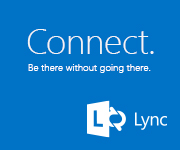Script: Set-WindowsEmailAddress.ps1 – Set WindowsEmailAddress Field for Users in a Non-Exchange Environment
 A friend of mine had a dilemma. Her environment doesn’t have Exchange, but does has some LDAP apps that query AD. They needed to set the WindowsEmailAddress field on all AD user accounts to first.last@domain.com. In Exchange, this is automatically set when a user is mail or mailbox enabled. No such luck here (and not for a lack of me trying!). And, since there are hundreds and hundreds of users, manually setting each user was a task best left for those with no life. So – PowerShell to the rescue.
A friend of mine had a dilemma. Her environment doesn’t have Exchange, but does has some LDAP apps that query AD. They needed to set the WindowsEmailAddress field on all AD user accounts to first.last@domain.com. In Exchange, this is automatically set when a user is mail or mailbox enabled. No such luck here (and not for a lack of me trying!). And, since there are hundreds and hundreds of users, manually setting each user was a task best left for those with no life. So – PowerShell to the rescue.
In the ActiveDirectory module, available on Domain Controllers, we have both Get-AdUser and Set-AdUser. These are really the only two cmdlets we need to fill the requirement. We essentially use Get-AdUser to get all of the users in a specific OU:
[object] $objUsers = Get-AdUser -filter * -ResultSetSize $null | Where-Object {$_.DistinguishedName -match $ou -and $_.GivenName -ne $null -and $_.Surname -ne $null}
$ou is defined as the target OU containing all users we want to process. The script will include all children OUs as well. Not in this OU are service accounts and non email enabled accounts. So we have an array with users. We’re 1/2 way there. We then cycle through the array using a ForEach and set the email address by combining the first name, a “.”, the second name, an “@”, and the SMTP domain. But I wanted to do some simple cleanup of the addresses. First concern was people with multiple names in either the first name or last name fields. Think “Billy Ray”. This was simple enough using a simple replace:
$strEmail = ($objUser.GivenName).replace(" ","") + "." + ($objUser.Surname).replace(" ","") + "@" + $SMTPDomainName
The second concern was consistent formatting of case. I’m a big believer that Capitalizing each word in an email or URL address (aka “CamelCase”) makes them easier to read quickly. Doing some digging around, I found Get-Culture.TextInfo.ToTitleCase. This will capitalize each word, so “billy ray cyrus” becomes “Billy Ray Cyrus”. Unfortunately, “BILLY RAY CYRUS” stays the same. A little ToLower() magic and poof – perfection:
$strEmail = ((Get-Culture).TextInfo.ToTitleCase($objUser.GivenName.ToLower()).replace(" ","")) + "." + ((Get-Culture).TextInfo.ToTitleCase($objUser.Surname.ToLower()).replace(" ","")) + "@" + $strSMTPDomainName
So we’ve got the users, and we’ve figured out how to create the email address. Lastly, we actually make the change. Within our loop, we simply run
Set-AdUser $objUser.SamAccountName -emailaddress $strEmail
Results in just a few lines!
Now, my friend hasn’t embraced the PowerShell way of life yet, so I figured I’d spruce things up a little. Rather than have to manually type the OU path, I found a post that showed how to create a GUI based OU picker. It got me about 3/4 the way there, and added ~100 lines to the script. I added the “OK” button and dumped the results back into the script. I added a prompt for the SMTP domain name as well. The script now adds a transcript for a record of what was done and some code to ensure the ActiveDirectory module is available and loaded (just in case the script is run from a normal PowerShell session and not the Active Directory Module for Windows PowerShell session).
I didn’t really add any error checking, as this is a one-off script meant to just save a little time.
if this is the first script you’re running, then
.\Set-WindowsEmailAddress.ps1 -SMTPDomainName [SMTP domain]
to execute the script. Follow the prompts. Pretty simple stuff.
Installation
Execution Policy: Third-party PowerShell scripts may require that the PowerShell Execution Policy be set to either AllSigned, RemoteSigned, or Unrestricted. The default is Restricted, which prevents scripts – even code signed scripts – from running. For more information about setting your Execution Policy, see Using the Set-ExecutionPolicy Cmdlet.
Donations
I’ve never been one to really solicit donations for my work. My offerings are created because *I* need to solve a problem, and once I do, it makes sense to offer the results of my work to the public. I mean, let’s face it: I can’t be the only one with that particular issue, right? Quite often, to my surprise, I’m asked why I don’t have a “donate” button so people can donate a few bucks. I’ve never really put much thought into it. But those inquiries are coming more often now, so I’m yielding to them. If you’d like to donate, you can send a few bucks via PayPal at https://www.paypal.me/PatRichard. Money collected from that will go to the costs of my website (hosting and domain names), as well as to my home lab.
Download
v1.2 – 01-27-2014 Set-WindowsEmailAddress.v1.2.zip
v1.1 – 10-01-2011 Set-WindowsEmailAddress.v1.1.zip
v1.0 – 06-12-2011Â Set-WindowsEmailAddress.zip
Changelog
See the changelog for this script which details all versions and their features.





Follow Me